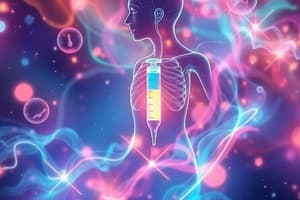Podcast
Questions and Answers
What is one of the primary mechanisms of action of metformin?
What is one of the primary mechanisms of action of metformin?
- Increases intestinal absorption of glucose
- Increases hepatic glucose production
- Decreases hepatic glucose production (correct)
- Decreases peripheral glucose uptake
Which of the following is a severe adverse effect associated with metformin?
Which of the following is a severe adverse effect associated with metformin?
- Weight gain
- Insulin resistance
- Lactic acidosis (correct)
- Hyperkalemia
Which condition is a contraindication for the use of metformin?
Which condition is a contraindication for the use of metformin?
- Normal kidney function
- Mild renal impairment
- Controlled hypertension
- Severe renal impairment (correct)
What is the recommended initial approach when prescribing metformin to geriatric patients?
What is the recommended initial approach when prescribing metformin to geriatric patients?
What should be done regarding the dose of metformin for a patient who was treated for hypothyroidism prior to pregnancy?
What should be done regarding the dose of metformin for a patient who was treated for hypothyroidism prior to pregnancy?
Which insulin regimen is most effective in improving long-term outcomes and reducing HgA1c?
Which insulin regimen is most effective in improving long-term outcomes and reducing HgA1c?
What is a significant consequence of a lack of insulin in the body?
What is a significant consequence of a lack of insulin in the body?
What primary function does basal insulin serve in glucose metabolism?
What primary function does basal insulin serve in glucose metabolism?
Which type of insulin is classified as 'bolus' and has a quicker onset?
Which type of insulin is classified as 'bolus' and has a quicker onset?
What is the typical percentage breakdown of basal and bolus insulin for a newly diagnosed type 1 diabetic?
What is the typical percentage breakdown of basal and bolus insulin for a newly diagnosed type 1 diabetic?
What is the initial daily insulin dose when starting treatment for a newly diagnosed diabetic, in U/kg?
What is the initial daily insulin dose when starting treatment for a newly diagnosed diabetic, in U/kg?
What is the duration of action for insulin glargine?
What is the duration of action for insulin glargine?
What factor can significantly influence the insulin dosing requirement?
What factor can significantly influence the insulin dosing requirement?
Which of the following factors is NOT important for effective bolus insulin management?
Which of the following factors is NOT important for effective bolus insulin management?
Which site of injection is generally recommended to avoid lipohypertrophy?
Which site of injection is generally recommended to avoid lipohypertrophy?
What is a major reason for avoiding intramuscular (IM) insulin injections?
What is a major reason for avoiding intramuscular (IM) insulin injections?
Which of the following factors is associated with Type II diabetes?
Which of the following factors is associated with Type II diabetes?
Which lifestyle factor is NOT typically linked to the management of Type II diabetes?
Which lifestyle factor is NOT typically linked to the management of Type II diabetes?
What condition is least likely to affect the effectiveness of insulin in Type II diabetes?
What condition is least likely to affect the effectiveness of insulin in Type II diabetes?
What is an essential factor to consider regarding carbohydrate consumption when administering bolus insulin?
What is an essential factor to consider regarding carbohydrate consumption when administering bolus insulin?
Which aspect should NOT influence the administration of prandial insulin?
Which aspect should NOT influence the administration of prandial insulin?
Flashcards
Bolus Insulin
Bolus Insulin
The insulin dose needed before a meal to control blood sugar levels after eating.
Carb Counting
Carb Counting
This refers to adjusting the bolus insulin based on the type and amount of food you eat.
Pharmacokinetics of Insulin
Pharmacokinetics of Insulin
The time it takes for insulin to start working and reach its peak effect. This varies depending on the type of insulin.
Intramuscular Insulin Injection (IM)
Intramuscular Insulin Injection (IM)
Signup and view all the flashcards
Insulin Resistance
Insulin Resistance
Signup and view all the flashcards
Impaired Insulin Secretion
Impaired Insulin Secretion
Signup and view all the flashcards
Elevated Glucose Production by the Liver
Elevated Glucose Production by the Liver
Signup and view all the flashcards
Lifestyle Factors
Lifestyle Factors
Signup and view all the flashcards
How does Metformin work?
How does Metformin work?
Signup and view all the flashcards
What is lactic acidosis?
What is lactic acidosis?
Signup and view all the flashcards
How does Metformin affect vitamin B12?
How does Metformin affect vitamin B12?
Signup and view all the flashcards
When is Metformin contraindicated?
When is Metformin contraindicated?
Signup and view all the flashcards
What is acquired hypothyroidism and its implications during pregnancy?
What is acquired hypothyroidism and its implications during pregnancy?
Signup and view all the flashcards
Which insulin regimens lower HbA1c?
Which insulin regimens lower HbA1c?
Signup and view all the flashcards
What are the adverse effects of insulin deficiency?
What are the adverse effects of insulin deficiency?
Signup and view all the flashcards
What is the purpose of basal insulin?
What is the purpose of basal insulin?
Signup and view all the flashcards
What is the purpose of bolus insulin?
What is the purpose of bolus insulin?
Signup and view all the flashcards
Which insulins are considered 'basal'?
Which insulins are considered 'basal'?
Signup and view all the flashcards
Which insulins are considered 'bolus'?
Which insulins are considered 'bolus'?
Signup and view all the flashcards
What is the onset of lispro insulin?
What is the onset of lispro insulin?
Signup and view all the flashcards
What is the duration of action of insulin glargine?
What is the duration of action of insulin glargine?
Signup and view all the flashcards
Study Notes
Insulin Regimens and Adverse Effects
- Insulin regimens, such as basal-bolus and intensive insulin replacement, can improve long-term outcomes by lowering HgA1c.
- Intensive regimens involve multiple daily injections or continuous subcutaneous administration via a pump.
- Lack of insulin can lead to adverse effects like hyperglycemia, ketoacidosis (acidic blood, fruity breath, weight loss, high triglycerides), and tissue catabolism.
Basal Insulin
- Basal insulin suppresses hepatic glucose production, maintaining near-normal blood sugar levels during fasting.
- Appropriate doses of basal insulin are crucial for managing blood glucose levels.
Bolus Insulin
- Bolus insulin (prandial/premeal) is used to cover extra glucose requirements after meals, minimizing post-meal blood sugar fluctuations.
Long-Acting Insulins
- Long-acting insulin analogs, such as glargine, detemir, and degludec, provide a flatter, more consistent plasma level over a longer duration.
Short-Acting Insulins
- Short-acting insulin analogs, like lispro, aspart, and glulisine, have a quicker onset, peak, and shorter duration of action, and are usually associated with less weight gain and lower hypoglycemia risk.
Insulin Onset and Duration
- Lispro insulin has an onset of 15-30 minutes.
- Insulin glargine has a duration of action of 20 to more than 24 hours.
Type 1 Diabetes Basal Insulin/Bolus Percentage
- 50% basal and 50% bolus is the general percentage of basal and bolus insulin for newly diagnosed Type 1 diabetics.
Factors Affecting Insulin Dosing
- Carbohydrate intake, pregnancy, puberty, and illness can affect insulin dosing requirements. These factors need to be considered when adjusting insulin dosage.
Total Daily Insulin Dose
- Initial total daily insulin dose when starting is 0.5 U/kg. While stabilized, typical doses are between 0.4-1 U/kg.
Bolus Insulin Considerations
- Factors like pre-meal glucose levels, carbohydrate consumption, and anticipated activity (e.g., exercise) should be considered when determining bolus insulin doses
Insulin Injection Sites
- Insulin is injected subcutaneously. Rotating injection sites helps prevent lipohypertrophy. Intramuscular (IM) injection is generally avoided.
Type 2 Diabetes Risk Factors
- Insulin resistance, impaired insulin secretion, elevated liver glucose production, reduced effectiveness of insulin on target cells, and overweight/obesity are all factors associated with Type 2 diabetes.
- Lean individuals can also develop Type 2 diabetes.
Metformin Mechanism of Action
- Metformin reduces hepatic glucose production, decreases intestinal glucose absorption, and improves insulin sensitivity.
Metformin Adverse Effects
- Gastrointestinal issues (nausea, vomiting, diarrhea) and lactic acidosis are potential side effects, especially with kidney problems, high doses, or severe illness.
SGLT2 Inhibitors Mechanism and Adverse Effects
- SGLT2 inhibitors increase glucose excretion in the urine.
- Potential adverse effects include volume depletion (leading to hypotension) and increased risk of urinary tract infections, especially in individuals with uncontrolled blood sugar.
GLP-1 Receptor Agonists (RAs)
- Enhance glucose-dependent insulin secretion.
- Slow gastric emptying, decreasing food intake.
- Reduce postprandial glucagon.
Glucagon and Liver Glucose Production
- Decreased glucagon production results in decreased liver glucose production.
Thiazolidinediones (TZDs)
- Insulin sensitizers in fat, muscle, and the liver.
Sulfonylureas Adverse Effect
- Hypoglycemia is a serious adverse effect associated with sulfonylureas
GERD Treatment
- Antacids provide faster relief, while PPIs provide longer-lasting effects. H2 antagonists are an intermediary option.
PPI Use in Elderly
- Prolonged PPI use in the elderly can lead to osteoporosis.
Sucralfate Mechanism of Action
- Sucralfate forms a paste that protects ulcers and the stomach lining from peptic acid, pepsin, and bile.
Topical Corticosteroids Potency
- Topical corticosteroid potency varies greatly. It is important to understand the potency scale and choose appropriate strength based on the area being treated.
Topical Corticosteroid Contraindications
- Infections, pre-existing skin conditions, areas of impaired wound healing etc . should be considered during topical corticosteroid use.
Oral Acne Medication
- Oral antibiotics like tetracycline, used as treatment for severe acne.
Thyroid Hormone Levels and Hypo/Hyperthyroidism
- Understanding normal Thyroid-Stimulating Hormone (TSH), thyroxine (T4), free T4 (FT4), triiodothyronine (T3) levels is important in assessing and managing hypo- and hyperthyroidism.
Levothyroxine MOA
- Levothyroxine is a synthetic form of T4, used to replace deficient thyroid hormones
Hypothyroidism Treatment
- Levothyroxine is often the first-line treatment of hypothyroidism.
Hyperthyroidism Treatment
- Treatments include antithyroid medications (methimazole, propylthiouracil) and in some cases ablation of thyroid tissue
Thyroid Storm
- Thyroid storm is a life-threatening condition characterized by extreme thyrotoxicosis. Treatments are aggressive and involve hospitalization.
Common ADEs with Topical Corticosteroids
- Purpura, striae, telangiectasia, and focal hypertrichosis can be common side effects.
Topical Corticosteroid Potency
- Topical corticosteroid potency varies widely. Choosing the appropriate strength is crucial to minimizing potential side effects, while managing the condition effectively.
Isotretinoin Monitoring
- Isotretinoin treatment involves rigorous monitoring of pregnancy, liver function, and other potential side effects.
Hypothyroidism Lab Values
- High TSH and low T4 values indicate hypothyroidism.
Levothyroxine Mechanism of Action
- Synthetic T4 hormone replacement is a mechanism of action for treating hypothyroidism.
Special Populations and Hypothyroidism Dosing
- Elderly and pregnant women require close monitoring and adjustments to their hypothyroidism dose.
Studying That Suits You
Use AI to generate personalized quizzes and flashcards to suit your learning preferences.




